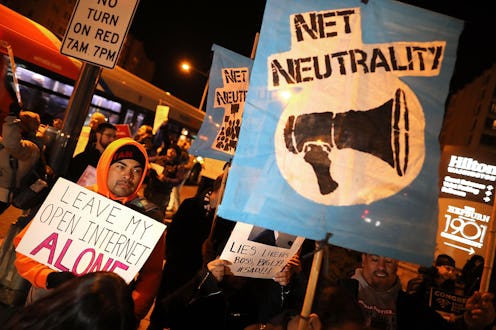
On Thursday morning, the Federal Communications Commissions' Republican majority is expected to vote in favor of dismantling Obama-era net neutrality regulations. Rolling back net neutrality legislation would give internet service providers the authority to increase and decrease loading speeds for certain apps and websites. However, if the FCC does indeed vote to dismantle these regulations, net neutrality would not end immediately.
Consumer interest groups are expected to challenge the FCC's decision in the courts by pursuing a lawsuit, Wired reported. According to NPR, such a lawsuit would be the fourth related court case over a 10-year period. "Whenever we do anything big and major, people go to court," a senior FCC official told CNN last month. "I certainly would not rule that out." Moreover, advocacy groups are also likely to put pressure on Congress to stop the FCC's decision from going into effect under the Congressional Review Act.
FCC Chairman Ajit Pai has described net neutrality regulations as an example of the government "micromanaging the internet," and he voted against these regulations back in 2015. But dozens of tech companies, including Twitter, Google, and Facebook have issued statements in support of net neutrality ahead of the FCC's vote.
Tech companies' criticism did not deter Pai, who said that companies like Google and Facebook can censor content and are therefore a "bigger actual threat to an open internet." These companies are not the only ones Pai has to worry about, though; a recent poll from the University of Maryland's Program for Public Consultation found that 83 percent of voters were opposed to repealing net neutrality regulations — including 75 percent of Republicans.
Internet service providers like AT&T, Comcast, and Verizon have promised not to block certain content despite having the ability to do so. However, consumers doubt providers' sincerity in the matter, especially because these providers will be able to prioritize their own content without reneging on their promises. For example, Verizon could theoretically prioritize Yahoo and AOL — which it owns — over Google, as long as it disclosed this information to consumers.
Internet service providers have argued that there is no financial incentive for them to block or penalize certain apps or websites. Instead, AT&T argued in a blog post that "this country will return to a rational regulatory framework similar to the one that capably governed the internet for decades" as a result of a net neutrality repeal. However, according to Politifact, providers can increase their bottom lines and participate in currently prohibited financial arrangements if net neutrality regulations are repealed. As long as these providers remain competitive, they would not be penalized by the FCC.
In 2004, when former President George W. Bush was still in office, then-FCC Chairman Michael Powell said that internet users should be guaranteed four freedoms: the freedom to access any web content (within legal limits); freedom to use any online application; freedom to use any device to access their home broadband connection; and the freedom to obtain subscription information from their internet service providers. These four freedoms formed a basis for the 2015 net neutrality regulations, and the possibility that these freedoms may be revoked is a driving force in advocacy groups' resistance to a potential net neutrality repeal.
Again, net neutrality will not disappear overnight, nor will video streaming services like Netflix, which has enough users and money to maintain its platform. As CNN pointed out, the real concern is that new websites and apps, as well as small business sites like Etsy, will have a difficult time negotiating with providers in order to be accessible to as many consumers as possible. However, if the FCC votes to repeal net neutrality regulations, it will almost certainly face an immediate legal challenge from consumer interest groups, and the issue is not likely to be settled quickly.